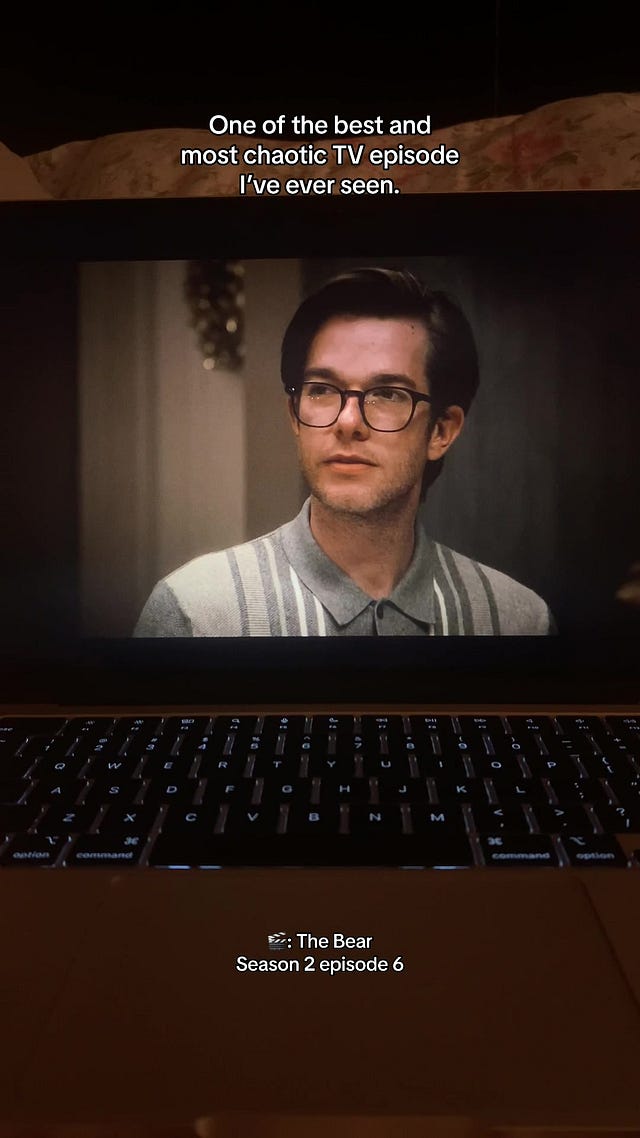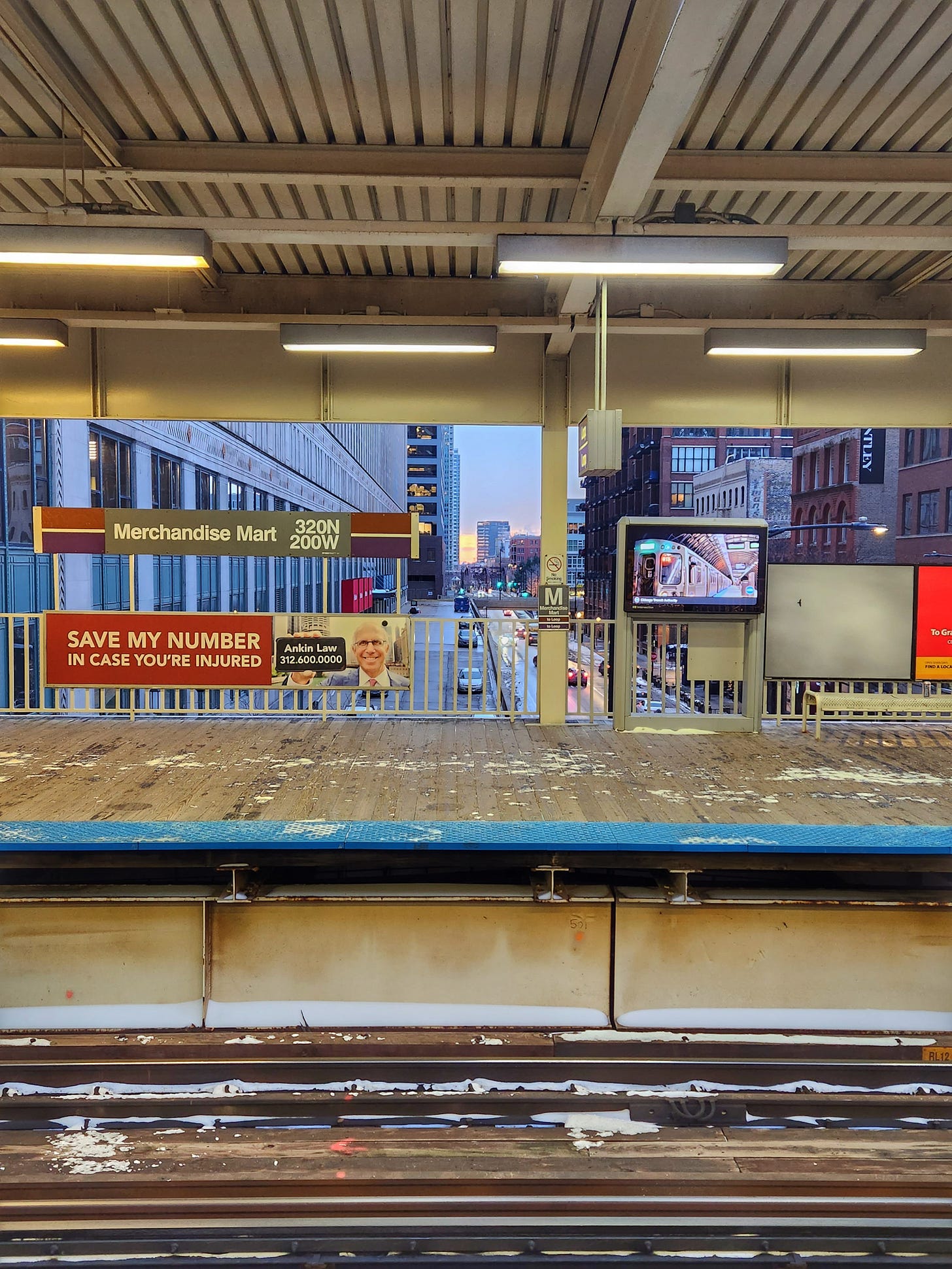Food scaffolds our lives. As it is with all of our scaffolds—sleeping, movement, other people—it is both easy for food to recede into the background and for food to be a central source of meaning or strife. For some—gourmets, gourmands, foodies; all terrible words—food and the craft of foodmaking is paramount. This itself has its joys and its sorrows. Those joys and sorrows scaffold The Bear.
The Bear’s central character is Carmen ‘Carmy’ Berzatto. Carmy is a master chef; he worked at Noma, The French Laundry, and was the chef de cuisine at ‘the best restaurant in the world’ in New York City (Food Republic suggests this was Eleven Madison Park since it is mentioned in an insult in the pilot; my interpretation is that they are intentionally silent on where he worked in NYC). He is deeply weathered from this experience, broken down. But he also has cooking for other people with maniacal precision engrained into him. When his sister asks him why he stayed at his New York restaurant despite he insanity of it, he simply says, “People loved the food.”
That world is behind him at the beginning of The Bear. He has come back to Chicago to run his family’s beef sandwich restaurant, The Beef. He returns in haunting circumstances, following the suicide of his enigmatic older brother Michael ‘Mikey’. As the show unfolds it is revealed that despite Carmy’s deep love for Mikey and their plans to open a restaurant, Mikey refused to let Carmy work with him at The Beef. This was a major contributing factor to Carmy leaving Chicago to become a culinary star. Meanwhile, Mikey fell into addiction and bad business practices.
Want a 7 minute rundown? The show has you covered
The show is full of stunning characters. The three behind Carmy in importance are Sydney, Richie, and Natalie (‘Sugar’ or ‘Sug’). Sydney is a young, ambitious classically trained chef that seeks Carmy out immediately and talks her way into being his sous chef. She is at the beginning of the path that Carmy has just trodden, aware of its necessary blows but not fully acquainted with them. Richie was Mikey’s best friend. He was the one chosen to be Mikey’s right-hand man, both in life and at The Beef. When the show starts he is at the height of a trauma induced spiral of Chicagoan toxic masculinity. Finally, Natalie is Carmy and Mikey’s sole sister. She hates The Beef and will not enter it in the first season. She is also clearly trying to break out of her family’s bad cycles; she marries a nice, square, definitely not Italian man and lives in what is clearly a new build condo. How successful this strategy has been is unclear.
Even in a TV landscape filled with innovative producing and directing, The Bear is amazingly put together. Many of its episodes are shot in an immensely frantic way, conveying the stress, pressure, and total bat-shit craziness of a restaurant kitchen. These episodes can be hard to watch, sputtering from disgusting messes around the kitchen to cooks on the verge of breakdowns to Carmie or Richie growing silent in their depressions. The pinnacle of this is Review (S1, Ep7), which is shot in one bouncy, frenetic take.
Watch only if you aren’t triggered by kitchen chaos
Not all of it is like this. This is partly because the show is also a love letter to the city of Chicago. In fact, the beginning of Review is a calm, beautiful montage of Chicago, perfectly paired with Sufjan Stephen’s ‘Chicago’. These snapshots of the wider world helps keep the show, well, watchable. But they also provide crucial cultural context, reminding us what restaurants are for, the role that they play in shaping a place and its people.
Cleanse your palate
It is clear from the beginning that the Berzattos (including honorary member Richie) are really fucked up. Some of this is explained by the restaurant industry, but we are never under any illusions that the ultimate explanation is genealogical. Natalie’s main role in the first few episodes is to remind Carmy how toxic their family is.
In the second season’s seventh episode, Fishes, the show tries to explain the Berzattos in one 65 minute flashback sequence (most episodes are ~30 minutes). It is the only episode with a sustained appearance from Mikey, making it the most sustained attempt to explain how his personality can hold such a huge sway over so many people. This is an ambitious task that easily could have been trite or oversimplified or cringy. This risk is only amplified by a dizzying number of big guest stars, from Jamie Lee Curtis playing the Berzatto matriarch Donna to Bob Odenkirk playing a sometime romantic interest of Donna to a very haggard looking John Mulaney playing the partner of a Berzatto cousin. There are many ways the episode could fail.
It is the only episode so far that doesn’t take place partly in the restaurant, but its setting still revolves around food. It is set on Christmas Eve approximately 5 years before the present on the occasion of the annual Berzatto Seven Fishes feast. It shows that professional kitchens are not the only places where you find frantic people near breakdown, nor is Mikey the only one on the brink. The same jumpy, tight camera work is used in many scenes, often focusing on the chaos of the kitchen.
Donna is a manic mess who is completely hammered by the time the meal comes out. The theme of the day is her inevitable breakdown. The episode starts with a shellshocked Natalie smoking a cigarette outside with Mikey imploring her to stop asking Donna if she is ok. The breakdown, many hours later, is triggered by Natalie asking her mother if she is ok, right after Donna sits down to the table after a prolonged delay. In between you have the slow build-up, including the origin story of Natalie’s ostensibly endearing nickname; it is because when she was little she added a cup of sugar instead a cup of salt to the red sauce, causing it to, in Donna’s words, ‘taste like fucking Hawaiian Punch.’ Interspersed are the non-nuclear (in more ways that one) guests having a generally fun time. This includes Odenkirk’s Lee, Mulaney’s Stevie, recurring characters Uncle Cicero and Neil, and Richie’s then-wife Tiffany.
In a reversal of its role in the restaurant, food here is a hollow, ceremonial farce. Donna has been up ‘since 4’ preparing the food, some assemblage of seven fishes (ironically seafood). The first words Carmy says to his mother upon entering the kitchen are, ‘Ma, why are you doing the seven fishes thing; no one ever eats this shit.’ Later, when she tells him to stir the red sauce (gravy), he asks her why they have gravy. She responds, ‘because no one ever eats this shit.’ Still, Donna makes the day about her preparation of the food, about how beautiful it is. In the end, her complaint is about how no one cares about her despite her sacrifices to make such a beautiful meal. As far as I can tell, no one eats any of it.
The end
Carmy and Natalie are clearly better off 5 years later, after Mikey’s death. Carmy is always, in the words of Mikey, a ‘mopey little shit’, but he is painfully insecure in ‘Fishes’. He is desperate for Mikey’s approval, which comes and then it doesn’t, and then it comes, and then it doesn’t. On and on. Donna is happy that he was convinced to come back from Copenhagen, but also never misses a chance to make fun of his pretensions. When Tiffany asks for Sprite to ease her morning sickness and they don’t have any, Carmy makes a lemon-lime soft-drink from scratch. This is clearly an amazing feat of culinary knowledge and skill; he is mocked for it by Richie and Donna, despite Richie and Tiffany finding it marvelous.
Natalie, meanwhile, is trapped by her mother. She knows the train will come off of the rails and badly doesn’t want it to. She doesn’t know how to stop the crash so limply stands off to the side asking questions she knows will only make things worse. She constantly looks like she just witnessed the clubbing of a puppy.
What of Mikey? This is the hardest narrative trick to pull off. He needs to be enigmatically desperate. It’s easy enough to show how Mikey is central to the Berzatto’s functioning, such as it is. He can handle Donna, he can console Natalie, he can ease Carmy’s insecurity. Showing the desperation at the same time is harder. Odenkirk’s Lee is there to push him along. At first Lee appears to be the patriarch. That impression is quickly pushed to the side. He is revealed to be some sort of real estate speculator who has been romantically involved with Donna. He doesn’t like Mikey and Mikey doesn’t like him.
Lee is affable until Mikey starts telling a story about one of his and Richie’s exploits. Lee snaps in the middle of the story, reminding everyone that Mikey tells it over and over. Mikey does not like his hero-bubble burst but lets it go. Later, when they’re waiting for Donna, Mikey picks the fight. He throws a fork at Lee, and then another. A real fight will start if he throws another. His family begs him not to. This is not that interesting on its own. But as Lee becomes more and more honest, Mikey becomes more and more desperate. Lee’s insults hit at the truth and Mikey’s eyes tell you it. This is the desperation. Carmy and Natalie can’t even look.
Before the boiling point, Mulaney’s Stevie gets to play the jester. Stevie is the partner of a Berzatto cousin, but he has been coming to seven fishes for many years. This is not the straight, silly Mulaney, but the addict Mulaney, sporting a two day fuzz and looking stoned. He does not want to say grace but is forced to, and does his best to diffuse the situation. Maybe he is also a bit profound.
Youtube doesn’t have this one. Sorry.

 Tiktok failed to load.
Tiktok failed to load.Enable 3rd party cookies or use another browser
The Bear is a triggering show for both those that work in the restaurant industry and those with dysfunctional families. It lays out the gory details of both and is made to heighten their trauma. While these are the details most often on the surface, the glory of serving others with love is always there, silently strived for. It is what keeps them going.
Restaurants are magical places. The drive towards restaurants is bizarrely strong—for patrons and for cooks and hosts. We spend huge amounts of time, money, and toil on them, and keep going back for more. The Bear pushes us to reflect about why this is. I am confident that there is a good answer. It’s crucial to maintain the scaffolding.





